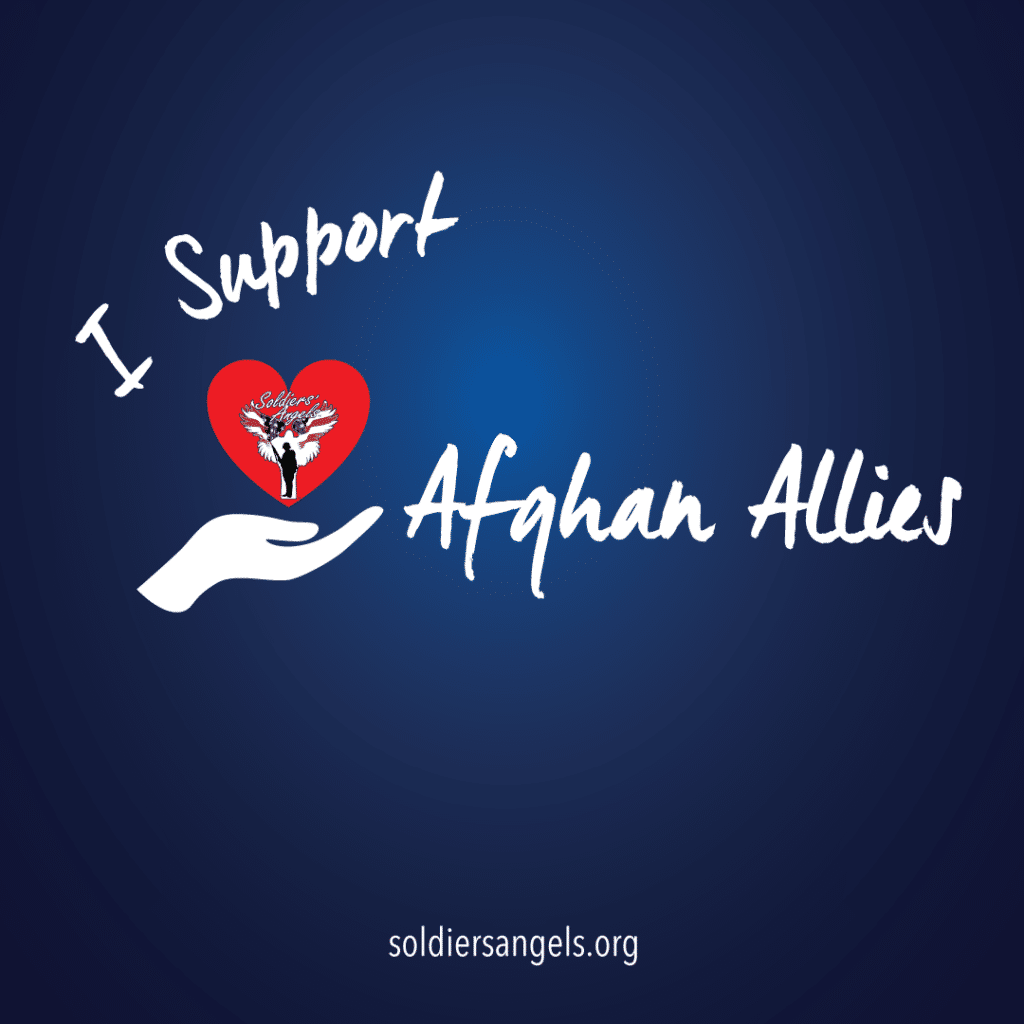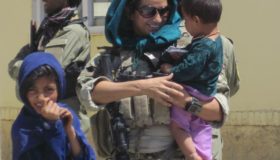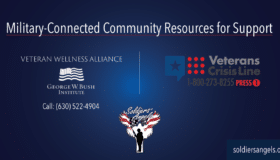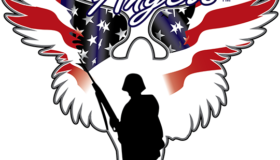Allies Welcome: Naim’s Story
September 21, 2021

20 years ago, Naim was just a child. He could have been a child living in any country in the world. But as fate would have it, Naim lived in Afghanistan.
September 11th, 2001 changed the course of so many lives— including Naim’s. As the story goes for hundreds of thousands of Afghans, Naim stood alongside the United States in the War on Terror. He worked for American contractors for over a decade filling various roles— from truck driver, to soldier, to combat medic for the contractors, and more.
Thankfully, Naim, his wife, and his four children, all under the age of eight, were fortunate enough to escape Afghanistan.
Earlier this month, Soldiers’ Angels had the opportunity to interview Naim from the safety of the United States. Although he just arrived in the country, he agreed to share his story with Soldiers’ Angels through a translator.
To keep his story as true to his words as possible, we transcribed the words as they were shared with us aside from the omission of sensitive details, such as locations, dates, or names that might jeopardize the safety of Naim or his family.
Interview with Naim
When Naim entered the room, it was easy to tell that he had not yet overcome the shock of what he experienced during the evacuation. As he sat there, nervously pinching his arm throughout the interview, it was apparent that he still had a level of fear and uncertainty due to so many years of witnessing tragedy. Here is his story:
Soldiers’ Angels: How was it getting over here? How was the trip?
Naim: It was very difficult and very significant for me. Because embassy called me, my visa was issued, to come to the embassy, but suddenly, everything collapsed to the hand of Taliban. We couldn’t able to get to the embassy because it got closed. And then while we were getting to the airport, it was very tough ‘cause all the routes were surrounded by Taliban. Everybody rushed to the airport and it was like heavy traffic of people, and I was scared if my children get… like… there was lots of children that died— people stepped on them. It was very, very tough and I couldn’t explain it in words.
Soldiers’ Angels: We’re so sorry. We’re just so happy you’re here and you’re safe and that your family and your children are safe. It was heartbreaking watching that on TV, it really was.
Soldiers’ Angels: What was your childhood like in Afghanistan?
Naim: My childhood was tough because I was working hard. Plus, I was in Pakistan, an immigrant to Pakistan. Then in the early 2000’s, somehow we moved back to Afghanistan, back to our village. But I don’t remember exactly what Taliban were doing there and what Afghanistan was like before that.
Soldiers’ Angels: I know you were young, but do you remember anything about what Afghanistan was like for women before 2001?
Naim: It was hard, like it was tough for women. Now, like the same now. They were forcing women to wear hijab.
Soldiers’ Angels: Like they are going backwards?
Naim: Yes, we are going backwards.
Soldiers’ Angels: After 9/11, how did Afghanistan change for you?
Naim: It changed a lot. It promoted—we got at once like in every section education-wise, economic-wise, everything.
Soldiers’ Angels: Got better?
Naim: Yeah, got better.
Soldiers’ Angels: Without going into detail, can you tell us what jobs you did for the US?
Naim: Yes, I got my job first over ten years ago. Since then, I have many jobs from driver, to soldier, to combat medic.
Soldiers’ Angels: So you were actually in the Afghan military?
Naim: No, I will explain that, we were not Afghan military, we were a team that was contracted with the US. We were not related to Afghan government.
Soldiers’ Angels: So over ten years ago—so you were still very young when you began working with the US?
Naim: Yes, I was still very young. It was my first job.
Soldiers’ Angels: Has this been your job ever since you started?
Naim: Yes.
Soldiers’ Angels: Was your decision to support the war efforts and work with Americans and contractors supported by your friends, family, and community?
Naim: It’s the root of Afghans— if the family is not supporting you, did not agree with you, you cannot do nothing. So my family was supporting me and my community was supporting me.
Soldiers’ Angels: Do you feel like your role in Afghanistan helped to save lives?
Naim: Yes, that was the main reason— to save others’ lives. We conduct lots of missions.
Soldiers’ Angels: Is there a story of a friendship with one of the American contractors you were working with that you would like to share?
Naim: I was on a mission where I lost a friend. And our advisor, who was an American contractor, he spent the whole night with us in the clinic, with our friend’s body. And we were all crying. So like, I feel very heartbroken for that advisor too.
Soldiers’ Angels: What do you think the future holds for Afghanistan?
Naim: As for now, there is no good future for Afghanistan. All the sacrifices we did is gone for nothing and like I cannot see any bright future for Afghanistan. Everything is darkness.
Soldiers’ Angels: Was there any chance that you wanted to stay?
Naim: There is no chance for us to stay there because now we are like every single moment we are thinking about our families that left over there in Afghanistan and they cannot get out of their houses. They cannot go anywhere because they are searching for them. So there is no chance to stay.
Soldiers’ Angels: Starting a new life is daunting, but what do you think your future holds in the U.S.?
Naim: Our future in the U.S. it seems like very bright one ‘cause our children gonna grow up here, like they gonna have a good study like go to good schools. And like our wives, they gonna grow too—it’s very good, I’m positive for my future.
Soldiers’ Angels: How have you been welcomed here so far? How have you been supported?
Naim: We were welcomed warm in Washington, DC. And I won’t forget that, we were welcomed very good. We are here and we’ve been supported by Miss <name omitted for security> and we really appreciate her. And we are looking forward.
Soldiers’ Angels: Without going into specifics, how do you feel about the location you’re resettling in?
Naim: It’s very good for me. Much better. I’m very positive about living here cause all my cousin’s friends are here and the weather is kind of same like Afghanistan.
Soldiers’ Angels: What are your hopes for your children who will grow up now in the U.S.?
Naim: I’m very hopeful for them. For their future, for education-wise, a good life. I hope they get to good schools and get a good education, and help others.
Soldiers’ Angels: Are your children doing okay after all of this? The trauma of getting over here?
Naim: They were very scared, but they are good now. While going from Afghanistan to Qatar, Qatar is very hot, and my oldest child, he was not eating nothing and then he got dehydrated. And I was yelling to the U.S. Army that my child is dehydrated and he’s almost unconscious. So they got there to my child to look him over and they said like after a few hours if he didn’t drink or eat sweets, he’s gonna die, up in Qatar. So then they start giving him food and water and stuff. So that was very tough for him. And it was very tough for me. I was very shocked about my son. But now they are very good. They are very happy.
Soldiers’ Angels: We can imagine that must have been tough! We’re glad to hear that they are doing good now. Is there anything else you would like to share and include in your story? I want to tell your story.
Naim: Beside the 20 years, like there was tough situation, there was like bad situation last 20 years, like every day was killing and bombing. But these two days, while I was coming from my house to Kabul to the airport, while I was seeing all the military personnel, not the personnel, like the tanks, the trucks, the Hum-V’s in the hand of Taliban, like the American pick-up trucks in the hand of Taliban, and they were putting check points, they were like hitting people, then when we got to the airport we saw children were stepped by people because it was bunch of like it was a flood of people, so I would never… nobody would ever forget it. If somebody was there, and saw the situation, nobody would ever forget this situation. And those two days.


